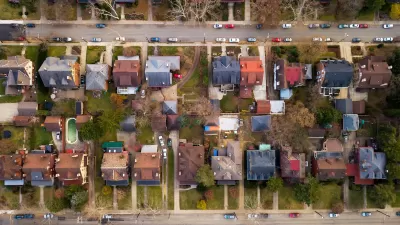The "Atlanta City Design: Housing" initiative is one of the most ambitious planning reform efforts of any large U.S. city, but it's just getting started.

Rebecca Bellan explores the potential of Atlanta's recent efforts to tackle housing affordability to end single-family zoning in the quickly growing city.
Inspiring the discussion is the city's "Atlanta City Design: Housing" (ACDH) initiative, announced at the end of 2020 by Mayor Keisha Bottoms as part of the city's One Atlanta Housing Affordability Action Plan. The City Design initiative promises policy reforms, i.e., zoning changes, to lower housing prices in the city.
The headline of Bellan's coverage focuses on whether the nascent initiative could achieve the sort of comprehensive reform, ending single-family zoning entirely, achieved by a relatively small number of cities and states in recent years, but the article goes into a lot more detail about the realities of land use policy and race in the city. The article provides a lot of detail about the initiative will work. So, for example:
The ACDH project breaks down the city into “growth areas” and “conservation areas” based on the physical nature of Atlanta. Growth areas represent the city’s densest locales that are ripe for further urban development. Conservation areas make up a larger portion of the city and include low-density residential regions and green space. To maintain the form and character of these neighbourhoods, “subtle” density could be added, which looks very different from building apartment buildings or other multifamily dwellings.
Among the policies that could be reformed through this process, Bellan lists accessory dwelling units, parking requirements, and urban enterprise zones, among others.
FULL STORY: Can Atlanta end single-family zoning?

Planetizen Federal Action Tracker
A weekly monitor of how Trump’s orders and actions are impacting planners and planning in America.

Chicago’s Ghost Rails
Just beneath the surface of the modern city lie the remnants of its expansive early 20th-century streetcar system.

San Antonio and Austin are Fusing Into one Massive Megaregion
The region spanning the two central Texas cities is growing fast, posing challenges for local infrastructure and water supplies.

Since Zion's Shuttles Went Electric “The Smog is Gone”
Visitors to Zion National Park can enjoy the canyon via the nation’s first fully electric park shuttle system.

Trump Distributing DOT Safety Funds at 1/10 Rate of Biden
Funds for Safe Streets and other transportation safety and equity programs are being held up by administrative reviews and conflicts with the Trump administration’s priorities.

German Cities Subsidize Taxis for Women Amid Wave of Violence
Free or low-cost taxi rides can help women navigate cities more safely, but critics say the programs don't address the root causes of violence against women.
Urban Design for Planners 1: Software Tools
This six-course series explores essential urban design concepts using open source software and equips planners with the tools they need to participate fully in the urban design process.
Planning for Universal Design
Learn the tools for implementing Universal Design in planning regulations.
planning NEXT
Appalachian Highlands Housing Partners
Mpact (founded as Rail~Volution)
City of Camden Redevelopment Agency
City of Astoria
City of Portland
City of Laramie





























